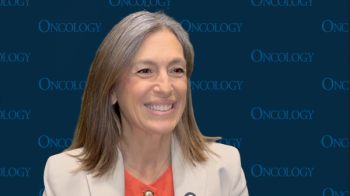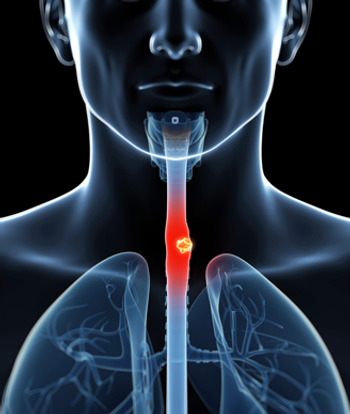
- ONCOLOGY Vol 20 No 5
- Volume 20
- Issue 5
Commentary (Putnam): Primary Combined-Modality Therapy for Esophageal Cancer
Based on positive results from the Radiation Therapy Oncology Group (RTOG) 85-01 trial, the conventional nonsurgical treatment of esophageal carcinoma is combined-modality therapy. Dose intensification of the RTOG 85-01 regimen, examined in the Intergroup (INT)-0123/RTOG 94-05 trial, did not improve local control or survival. Areas of clinical investigation include the development of combined-modality therapy regimens with newer systemic agents, the use of 18F-fluorodeoxyglucose positron-emission tomography to assist in the development of innovative radiation treatment planning techniques, and the identification of prognostic molecular markers. The addition of surgery following primary combined-modality therapy apparently does not improve survival, but this finding is controversial.
In this issue of ONCOLOGY, Dr. Minsky provides a compelling argument for combined-modality therapy (ie, chemotherapy and radiation therapy) for esophageal carcinoma. The need for sustained improvements in both local and systemic control is painfully real to our patients and to physicians treating this disease. In the United States, approximately 14,450 new cases of esophageal carcinoma will be diagnosed in 2006, and 13,770 patients-more than 75% male-will die of the disease.[1] According to the Surveillance, Epidemiology, and End Results (SEER) statistics, the 5-year survival rate for esophageal carcinoma based on stage at diagnosis (1995-2001) is 14.9% overall: 31.4% for local disease; 13.8 for regional disease, and 2.7 % for distant disease.[1] Combined-modality therapy for systemic control has become a well-accepted standard for unresectable or medically inoperable patients.[2]
Challenges of Combined-Modality Therapy
Combined-modality therapy has been used successfully to treat carcinoma of the esophagus.[3] In North America, most patients with this disease have distal adenocarcinoma of the esophagus, which may involve the gastro-esophageal junction. A meta-analysis of induction combined-modality therapy followed by resection noted that this treatment sequence improved 3-year survival and reduced local recurrence compared to resection alone.[4]
Although complete pathologic response is associated with improved survival following combined-modality therapy, we cannot consistently define which patients will have a complete response and which will have residual microscopic disease,[5] to select patients who would optimally benefit from resection. Esophagectomy after combined-modality therapy decreases locoregional recurrence compared to no resection[6] but may increase morbidity.
The recent MRC Adjuvant Gastric Infusional Chemotherapy (MAGIC) trial[7] noted that perioperative chemotherapy significantly improved resectability, progression-free survival, and overall survival in operable gastric and lower esophageal cancer patients. National Comprehensive Cancer Network (NCCN) guidelines recommend combined-modality therapy alone, or induction combined-modality therapy with resection.[2]
The use of combined-modality therapy in lieu of resection poses specific challenges, including:
• Inconsistent clinical staging prior to any therapeutic intervention.
• Variable systemic and local control without resection.
• Lack of any defined role of chemotherapy and radiation in early disease (eg, high-grade dysplasia, or stage T1, N0, M0).
• Lack of a standard evaluation of response to treatment.
• Subjective, rather than objective, measurement of dysphagia and symptom relief (ie, improvement of quality of life). Although the FACT-E has been commonly used, this assessment is designed for chemotherapy symptoms rather than surgical results. Recurrence of dysphagia (and recurrence of tumor) after combined-modality therapy alone may be inconsistently documented given the paucity of additional effective treatments.
• Consistency of follow-up and evaluation (after treatment), including detection and documentation of recurrence, and need for follow-up.
• Variable outcomes with increased costs.
Esophageal Resection
The morbidity and mortality of esophageal resection is well known, and a recent prospective randomized series suggests that a mortality of 6% (or lower) can be achieved.[8] Although induction chemotherapy was not shown to improve survival in this study, another recent study[9] demonstrated improved survival in patients receiving induction chemotherapy (16.8 vs 13.3 months for resection alone). Facility with the esophagectomy itself is a quality indicator, but the small number of patients seeking treatment diffuses experience in both combined-modality therapy and esophagectomy. Patients undergoing esophagectomy in hospitals performing fewer than five of these procedures per year have a mortality rate of 10% to 20%. Typically, these patients have the most consistently favorable outcomes at centers with surgeons who perform this operation frequently.[10] The surgeon who performs such esophageal procedures occasionally cannot consistently achieve acceptable rates of morbidity and mortality.
The surgeon must balance the risk of resection with the anticipated benefits of enhanced quality of life and better survival. Although the choice of operation does not significantly affect long-term survival,[11] the attendant risks in the early perioperative period (typically through 30 days after resection) and beyond must be minimized for resection advantages to be identified in clinical trials.
Clinical Trials
Excellent surgical results are required to eliminate compounding variables of surgical mortality. In addition, morbidity and mortality from combined-modality therapy must be accurately collected. The use of propensity analysis or a retrospective review of prospectively collected data is limited in that the refined and subjective judgment of the clinician can select optimal therapy for individual patients. This observation may be a result of access to high-volume centers with expertise in esophagectomy, aggressive medical oncologists using specific combination chemotherapy, and/or talented radiation oncologists using standard, conformal intensity-modulated radiation therapy or proton therapy for improved treatment.
Still, many studies reflect a higher-than-expected surgical mortality, lack of appropriately powered groups, limited follow-up, and scant quality-of-life results. Solutions to these specific challenges can be effectively met through prospective clinical investigations. The National Cancer Institute and Cancer Therapy Evaluation Program recognize the critical role of the cooperative groups in this process. Unique challenges that involve choices of chemotherapeutic and/or targeted agents, sequence and dosing of radiation, technique of esophagectomy (eg, transhiatal, transthoracic, minimally invasive, or radical en bloc esophagectomy), and analysis of images for recurrence must be considered in the creation of these trials.
Targeted therapies based on genomic or proteomic information could be developed. Surgeons who advocate specific operations and medical oncologists who advocate specific chemotherapies must strive to select the best combination, ie, the combined-modality therapy-plus-resection strategy that is most likely to succeed. Rapid design, implementation, accrual, and analysis of future clinical trials in esophageal carcinoma represent our best opportunity for the development of improved therapeutic approaches.[12]
Conclusions
Surgery remains a necessary treatment intervention for carcinoma of the esophagus and is often incorporated as a component of a combined therapeutic approach. Still, resection alone provides only a mechanical therapeutic intervention (local control) for a biologic problem. In locally advanced disease (> T1, N0, M0), combined-modality therapy provides better outcomes than either chemotherapy or radiation therapy as a single modality.
Induction combined-modality therapy followed by resection has been embraced in the United States based on a preponderance of phase II data and limited phase III data. The benefit from induction combined-modality therapy plus resection may be limited to patients responding to the induction therapy (ie, with a major response or pathologic complete response). Improvement in assessment of local control and survival following combined-modality therapy with or without resection will need to be evaluated in a prospective clinical trial. Our patients are waiting.
-Joe B. Putnam, Jr, MD
Disclosures:
The author has no significant financial interest or other relationship with the manufacturers of any products or providers of any service mentioned in this article.
References:
1. Cancer Facts & Figures 2006. Atlanta, American Cancer Society, 2006.
2. National Comprehensive Cancer Network: Esophageal cancer. Clinical Practice Guidelines in Oncology-version 1.2006.
3. Minsky BD, Pajak TF, Ginsberg RJ, et al: INT 0123 (Radiation Therapy Oncology Group 94-05) phase III trial of combined-modality therapy for esophageal cancer: High-dose versus standard-dose radiation therapy.J Clin Oncol 20:1167-1174, 2002.
4. Fiorica F, Di BD, Schepis F, et al: Preoperative chemoradiotherapy for oesophageal cancer: A systematic review and meta-analysis. Gut 53:925-930, 2004.
5. Swisher SG, Holmes EC, Hunt KK, et al: The role of neoadjuvant therapy in surgically resectable esophageal cancer. Arch Surg 131:819-824, 1996.
6. Geh JI, Crellin AM, Glynne-Jones R: Preoperative (neoadjuvant) chemoradiotherapy in oesophageal cancer. Br J Surg 88:338-356, 2001.
7. Cunningham D, AllumWH, Stenning SP, et al, for the NCRI Upper GI Cancer Clinical Studies Group: Perioperative chemotherapy in operable gastric and lower oesophageal cancer: Final results of a randomised, controlled trial (the MAGIC trial, ISRCTN 93793971) (abstract 4001). J Clin Oncol 23(16S):308s, 2005.
8. Kelsen DP, Ginsberg R, Pajak TF, et al: Chemotherapy followed by surgery compared with surgery alone for localized esophageal cancer. N Engl J Med 339:1979-1984, 1998.
9. Medical Research Council Oesophageal Cancer Working Group: Surgical resection with or without preoperative chemotherapy in oesophageal cancer: A randomised controlled trial. Lancet 359:1727-1733, 2002.
10. Swisher SG, Deford L, Merriman KW, et al: Effect of operative volume on morbidity, mortality, and hospital use after esophagectomy for cancer. J Thorac Cardiovasc Surg 119:1126-1132, 2000.
11. Putnam JBJ, Suell DM, McMurtrey MJ, et al: Comparison of three techniques of esophagectomy within a residency training program. Ann Thorac Surg 57:319-325, 1994.
12. Gaissert HA, Casale AS, Creswell LL, et al: Mentoring clinical trials in thoracic and cardiovascular surgery: A new role for the Society of Thoracic Surgeons. Ann Thorac Surg 77:1874-1875, 2004.
Articles in this issue
almost 20 years ago
Whatever It Takesalmost 20 years ago
Docetaxel Approved for Advanced Stomach Canceralmost 20 years ago
Primary Combined-Modality Therapy for Esophageal Canceralmost 20 years ago
Adjuvant Therapy for Colorectal Cancer: Yesterday, Today, and Tomorrowalmost 20 years ago
Rituximab Effective in Treating Chronic Graft-vs-Host Diseasealmost 20 years ago
Fertility-Preserving Options for Cervical Canceralmost 20 years ago
Commentary (Kuban): Permanent Prostate BrachytherapyNewsletter
Stay up to date on recent advances in the multidisciplinary approach to cancer.



































